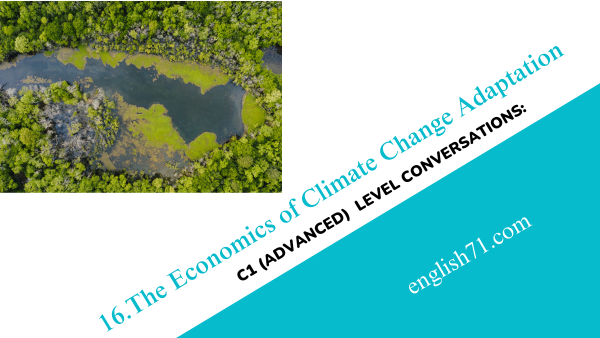C1 (Advanced) level Conversations: (16)The Economics of Climate Change Adaptation

Ali: Hi Richard, have you been following the discussions on the economics of climate change adaptation lately?
Richard: Hi Ali, yes, I have. It’s a complex issue with far-reaching implications.
Ali: Absolutely. Climate change adaptation involves significant economic considerations. Have you seen any promising strategies being discussed?
Richard: Indeed. One approach gaining traction is investing in resilient infrastructure to withstand extreme weather events. It’s costly upfront but can save money in the long run.
Ali: That makes sense. I’ve also read about nature-based solutions like reforestation and wetland restoration, which can provide cost-effective adaptation benefits while also supporting biodiversity.
Richard: Nature-based solutions are crucial. They not only enhance resilience but also offer additional benefits such as carbon sequestration and improved water quality.
Ali: Definitely. It’s encouraging to see the recognition of nature’s role in climate adaptation. What are your thoughts on the role of insurance in climate risk management?
Richard: Insurance mechanisms like parametric insurance can help transfer climate risks and provide financial protection to vulnerable communities. However, there are challenges in ensuring affordability and accessibility.
Ali: Agreed. Access to insurance can be a barrier for low-income communities. Perhaps there should be more focus on innovative financial instruments that cater to their needs.
Richard: Absolutely. It’s crucial to ensure that climate adaptation measures are inclusive and equitable. What about investments in research and development for new technologies?
Ali: R&D investments are essential for developing innovative solutions to climate challenges. Technologies like climate-resilient crops or advanced weather forecasting systems can significantly enhance adaptation efforts.
Richard: Indeed, technology plays a pivotal role. However, there should also be mechanisms to ensure technology transfer to developing countries to bridge the adaptation gap.
Ali: Absolutely. International cooperation and financial support are vital for assisting developing nations in their adaptation endeavors.
Richard: Agreed. Ultimately, addressing the economics of climate change adaptation requires a multi-faceted approach involving government policies, private sector investments, and community engagement.
Ali: Well said, Richard. It’s heartening to see the growing recognition of the economic imperative of climate adaptation. Let’s hope for continued progress in this crucial area.
Richard: Absolutely, Ali. Our collective efforts today will determine the resilience of future generations to climate change impacts.



Summary:
Ali and Richard engage in a comprehensive discussion on the economics of climate change adaptation. They explore various strategies, including resilient infrastructure, nature-based solutions, insurance mechanisms, and investments in research and development. Both emphasize the importance of inclusive approaches, international cooperation, and innovative solutions to address the economic challenges of climate adaptation. Their conversation highlights the complexity of the issue and the need for concerted efforts to build resilience against climate change impacts.

